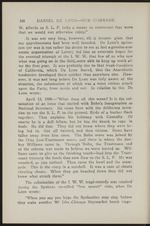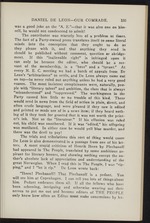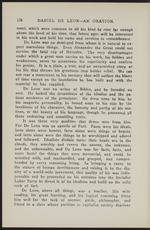| 1 |
 |
“...106
DANIEL DE LEONOUR COMRADE.
W. affords us S. L. P. folks a means to counteract that wave
that we would not otherwise enjoy.
It was not very long, however, till it became plain that
my apprehensions had been well founded. De Leons optim-
ism (or was it not rather his desire to see at last a genuine eco-
nomic organization of Labor) led him to entertain hopes for
the eventual triumph of the 1. W. W. that few of us who saw
what was going on in the field, were able to keep up much af-
ter the first year. It was probably due to that freak-frauddom
of California, which De Leon feared, that the Anarchistic
tendencies developed there quicker than anywhere else. How-
ever, it was not long before De Leon was fully aware of the
situation, the culmination of which was a most vicious attack
upon the Party, from inside and out. In relation to this De
Leon wrote:
April 13, 1908.What does all this mean? It is the cul-
mination of an issue that started with Bohns inauguration as
National Secretary. He...”
|
|
| 2 |
 |
“...membership, is a "boss and a "tyrant. At
every N. E. C. meeting we had a batch of appeals from De
Leons "arbitrariness to settle, and De Leon always came out
on tophe never ruled out anything unless he had a very good
reason. The most insistent complainants were, naturally, peo-
ple with literary talent and ambition, the class that is always
"misunderstood and suppressed. The workingmen in the
Party caused him little or no trouble of this kind. These
would send in news from the field of action in plain, direct, and
often crude language, and were pleased if they saw it edited
and printed or made use of in a news item; if they heard noth-
ing of it they took for granted that it was not worth the print-
ers ink. Not so the literateur, If his effusion was ruled
out, his child was smothered. If it was "edited, his offspring
was mutilated. In either case he would yell blue murder, and
there was the devil to pay!
The trials and tribulations this sort of thing would cause
De Leon is also demonstrated...”
|
|
| 3 |
 |
“...of the boring
from within policy in an organization started in many cases
by the bosses themselves, as was the case with many a local
of the Brewery Workers; or the identity of fancied as well as
real immediate material interest with the small manufacturer
against the large companies, as in the case of the Cigar Mak-
ers. Besides these factors, the material interest of labor lead-
ers whose numbers were legion must be understood.
Only by having a clear insight into all this, is it to be made
plain that to bore from within under such conditions was like
playing against loaded dice. Only by knowing how many soft
jobs were made insecure, and the immediate material interest
of numerous and varied groups affected can it be understood
why the S. T. and L. A. met such fierce resistance and brought
about within the Socialist Labor Party itself such a furious
storm of opposition against De Leon and De Leonism.
The following episode of those days throws a strong light
upon these conditions. In the...”
|
|
| 4 |
 |
“...looked very full of promise indeed. Although the former S. T.
& L. A. men were in the majority in this district council they
did at no time as much as assert their connection with the
S. L. P., so as not to give offense to some delegates who were
S. P. members, like Hanneman; ultra conservatives like Ke-
ougb, of the stationary engineers, or Anarchists like Dumas,
of the silk workers.
The self-denying, conciliatory demeanor of the former
S. T. & L. A. men was of no avail, for it soon became as plain
as day that no matter to what lengths of tolerance the delegates
who were true industrial unionists went, there were always
some who shouted that they were abused by De Leonites.
High Hopes Raised by Debs
In December, 1905, Debs came to New York to speak for
the 1. W. W. His first speech was delivered before a large
audience in one of New Yorks largest halls, the Grand Cen-
tral Palace. This speech was taken down stenographically
and afterward published in pamphlet form. Surely none could
find...”
|
|
| 5 |
 |
“...any other organization runs strikes. The
opportunity of speaking to thousands of wage workers en-
gaged in a struggle for better conditions was utilized to im-
part to them class consciousness, to enlighten them upon the
goal of the Socialist movement. It was not the old story
dished out by the old as well as the new type of strike lead-
er: Boys, stick together and you will win," or, Beat up
the scab, etc. The workers were told what they could ex-
pect while capitalism lasts; they were told in plain words that
the workers produce all wealth and are entitled to all they
produce, but that nothing can be gained unless it is gained
through solidarity, through united intelligent action on both
the political and the industrial fields.
Fifty speakers of the Detroit I. W. W. were on the strike
scene; Herman Richter, the general secretary was among
them. Arthur E. Reimer, Caleb Harrison, Frank Young, Au-
gust Gillhaus, Robert McLure, Olive M. Johnson, Margaret
Hilliard, Edmund Seidel, M. Angelevski...”
|
|
| 6 |
 |
“...ORATION.
ment, which were common to all his kind he fose far enough
aboTC the level of his time, that future ages will be interested
in his work and hold his name and services in remembrance.
De Leon was no demi-god from whom it is natural to ex-
pect marvelous things. Even Alexander the Great could not
survive the fatal cup of Hercules. The very disadvantages
under which a great man carries on his work, his foibles and
weaknesses, serve to accentuate his superiority and confirm
his genius. It is a plain, a true, and an unvarnished story of
his life that throws his greatness into bolder relief. We can
not rear a monument to his memory that will outlast the blasts
of time except on the foundation he has built and with the
material he has supplied.
De Leon was no writer of Bibles, and he founded no
sect. He lacked the dreaminess of the idealist and the pa-
tient meekness of the proselyter. He drew none to him by
his magnetic personality, he bound none to his side by the
loveliness of his character...”
|
|
